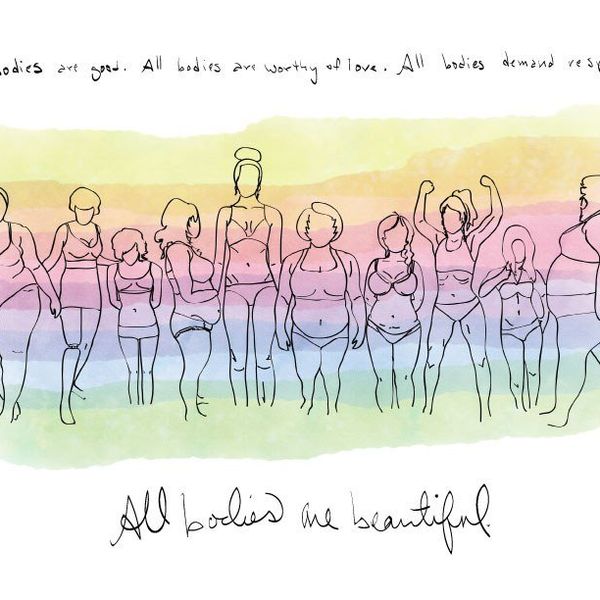No matter what social media website it is that you primarily use, you’ve probably seen a post or two featuring either a large girl wearing a bikini or her underwear, or a group of girls ranging from a size double zero to a 2XL: and then some caption, having to do with learning to love your body for what it is and with all its flaws. If you scroll through the comments of said post, you’ll see all the supporters of these girls, all the comments saying how you should love yourself, and how society needs to treat girls of all sizes equally. Then, you’ll see comments in which people bash the bigger girls for loving themselves -- the comments proclaiming that fat-positive posts promote poor health, laziness, and/or a poor life. My absolute favorite comment that I’ve seen used frequently on these posts is that the movement is an excuse, for fat “chicks” -- as these people seem to always call women -- to not work out.
Everybody is entitled to their own opinions, but the fact of the matter is those people who take the time out of their lives to put other people down for loving themselves -- which really is such a rarity in the world, today -- they’re wrong. It’s people like those that are the reasons why we need a movement like this in the first place. While there has been an uprising in acceptance of bodies that are on the bigger side, there are still far too many people both putting down those people for their so-called “unhealthy lives,” or using this movement as an excuse to put shame on the thinner people around them. In short, all bodies, no matter how big or small, deserve to be loved by those who live in them. We deserve to feel comfortable in our own bodies, especially with so many outside pressures telling us that this and that are right and wrong, that you’re not a good person or physically attractive for all these different reasons. But to really get the gist of what I’m trying to voice for, here’s some vital information:
About the body-positive movement
The body-positivity movement is a (mainly social-media based) rally to provide safety and comfort for all men and women who don’t love the body that they’re in; as well as a movement for those who love their body, but are too scared to portray it for the fear of being seen as conceited. It doesn’t necessarily mean helping these people gain or lose weight, or change their body in its physical form: it’s a movement to help improve each other’s mental health, and to improve how we see ourselves and other people in a positive manner.
Back in the times of the Renaissance, for example, men and women were praised for being fat. This showed others that they were wealthy enough to eat regularly, which was something that most people could only dream of doing. This was those peoples’ ideas of attractive: a person fed enough to become as big as they were, in comparison to others; and a person who was wealthy, which meant that they were not a peasant, or someone of a lower power. Fast-forward to the 1920s, and women were praised for their fuller figures -- think of Marilyn Monroe’s body. That was the ideal look. In fact, there were ads for ironized yeast and lard supplements between the 1920s and 1950s that promoted weight gain for skinnier women. Here’s an example of one of those ads.
On the other hand, men weren’t as much looked up to for what they looked like --although, being bigger was somewhat promoted -- but they were more attractive for being a family man. What was “in” for those men was what significant others everywhere saw as husband material. The ideal man would go to work all day, thus bringing home money so that his family could live an abundant life. Later on, in the early 2000s, if you weren’t stick thin, you were flat-out disgusting in most peoples’ eyes.
Now, in the 2010s, you either need to be as thin as a model, as muscular as an athlete, or as thick as a Kardashian to be attractive: this goes for both men and women. Big butts and breasts, as well as tiny waists, long hair and full lips are “in” for women; while men are expected to be taller than six feet, have abs like this guy, and have a chiseled jaw bone.
Expectations of the ideal body have changed vastly throughout history, and they’ve changed so many friggin’ times. Why do we need to keep up with these expectations? Why can’t all bodies and shapes and figures be beautiful, and not just the ones that are portrayed the most by the mass media?
Because that would be just too easy. The “body-posi” movement, as some may shorten it to, is to stand up for ourselves and prove that we don’t need to fit these standards to be beautiful. We don’t need to fit these standards to love ourselves and embrace our flaws, and we don’t need to fit these standards in order to be healthy, either. It’s to prove that we don’t need to hide our confidence, and we don’t need to be embarrassed by our bodies’ natural functions, such as growing hair where it looks “weird,” or breast-feeding in public.
What does the movement entail?
To begin, I’ll tell you that the movement is not any of the following:
- An excuse for people to not work out.
- An excuse for fat people to shame skinny people.
- An excuse for skinny people to shame fat people.
- An excuse for anyone to shame any type of body.
- An excuse to mistreat your body in any way, including lack of exercise, over-exercise, malnourishment, consuming excessive amounts of foods or drink that can harm you, et cetera; a movement to promote poor health.
What the movement is, rather, is the following:
- A reason to treat your body with care.
- Motivation to live a healthy lifestyle -- or not! Whichever you chose, as long as it makes you happy.
- A way for people to bond with one another over the same passions and goals, to bond over your own self-appreciation.
- A way for people to express their appreciation for others.
- A reminder that everybody’s body is different, and equally amazing in different ways.
- A way for those with physical medical conditions -- whether it be missing or immobile limb(s), or a metabolic (and therefore, usually, an under or over-weight related) issue -- to feel more accepted and “normal” in a society that focuses on “perfection” and sameness.
- The path to realizing that not all “lightning tattoos” (stretch marks) are dainty and white, but some are big and puffy and red or purple; to realizing that cellulite can exist anywhere on the body, not just your tush and thighs; to realizing that acne might not look great, but most people do have it, and it doesn’t mean your hygiene is poor if you do too; to realizing that bones don’t mean super-healthy or anorexic, just like fat doesn’t mean diabetic or lazy.
- A way for those with psychological medical conditions to work towards recovery, to work towards self-acceptance, or to at least lessen their harsh symptoms.
- A way for transgenders to accept their own bodies, whether they’re still pre-transition, or in the middle of transitioning.
- A way for gender fluid people to feel more comfortable with presenting themselves as a male one day, and a female the next.
You can believe all you want that the body-positivity movement is a movement to promote an unhealthy lifestyle and to make fat girls feel better for being fat (because fat is “unattractive,” and therefore the only indication that a person is unhealthy, right?). However, to think that is ignorant, because the movement is not just a focus on fat girls. It’s a movement for girls and boys, for men and women, and everybody in-between: it’s a movement for people, a movement for self-love, a movement for others to learn to love each other.
Why do we need this movement so badly?
Well, some of the reasons we need to spread body-positive thoughts and express our love for our own bodies openly have already been discussed: if we don’t love ourselves, that can lead to obvious mental health issues, like depression, eating disorders, and dysmorphic issues with our bodies.
We need this movement for the people who were born as one gender, but identify as another; so that they can openly dress how they want and get the changes they need, without fear of judgement.
We need this movement so that skinny people stop feeling like they’re society’s new target, in a world that’s beginning to accept bigger people gradually; so that they can go out with friends or to family functions without being told to “eat a cheeseburger,” or that they should put on some weight, or that they look fragile and should hit the weights more; so that they don’t need to be uncomfortable with loving cardio and veggies, if someone tells them they try too hard.
We need this movement so that fat people stop feeling that they’re not attractive enough, so that they stop feeling like the ultimate conveyer of poor health; so that they could go to the gym or go for a run without feeling embarrassed, so that they could eat whatever the hell they want or work out as little as they want without feeling like they’re “gross.”
We need this movement so that those with eating disorders can hopefully be influenced to make healthier decisions, and take better care of their bodies; so that anorexics and bulimics can recover without feeling that their weight-gain will destroy them; so that binge eaters can recover in a healthy way, in a way that doesn’t involve falling into another disorder that regularly includes starvation or purging. I may have missed a few possible scenarios, but I think you get the idea now.
On a more personal level, my body doesn't fit our society's physical standards of a healthy figure. Don't get me wrong -- I eat a healthy, mostly plant-based diet, and I exercise every day. Going to the gym and trying new, healthy recipes are some of my favorite hobbies. But because of my underlying medical conditions, I need to buy new, bigger clothes every year; sometimes more than once a year. Because of these issues, I'm borderlining obesity. I need this movement to feel not only validated, but to feel respected in a society that deems big people to be unequal. People like me -- who live with healthy habits, and treat their bodies with care, but don't get the physical or mental feedback they deserve -- need this movement in order to thrive in a society that sees differences as unappealing and less worthy.
We need this movement because as long as society’s idea of attractive is changing, we’re never going to be satisfied with our own body or mind; therefore, we have to advocate for ourselves. This is a movement for our health, mental or physical. It’s a movement to bring people together, a movement to spread love and awareness for any issues others may have with their bodies, or even the bodies of others. The movement towards body-positivity is a movement of self-empowerment, and it’s one that we can’t let die out. In my opinion, it’s amongst some of the most significant movements we have today. It’s a movement of self-appreciation, in a self-depreciating world.





















